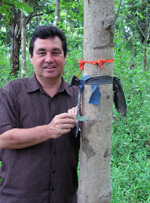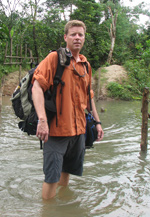Research Links Carbon Markets and Tree Planting to Slow Global Warming, Fight Poverty David Skole
A team of MSU scientists is combining sustainable forest management with emerging carbon markets in a unique effort to help small farmers in developing countries grow crops that will boost their standard of living and slow climate change.
A team of MSU scientists is combining sustainable forest management with emerging carbon markets in a unique effort to help small farmers in developing countries grow crops that will boost their standard of living and slow climate change.
Called Carbon2Markets, the program includes collaborative projects with farmers, researchers and government agencies in 10 Asian and African countries. The farmer groups are integrating high-value forest crops such as jatropha, teak or shea into the crops they're currently growing using methods that are smart and sustainable. Then the farmers use techniques and standards created by MSU remote-sensing experts to accurately measure and record the carbon stored by the trees and soil. Storing carbon in the soil and plants keeps it out of the atmosphere and helps slow global warming.
Besides being one of the first efforts to help small landowners gain access to the carbon offset market, the project also helps support the research goals of its collaborators, such as Thailand. This hasn't always been the case when developed countries work with developing countries.
"We are very pleased to collaborate with Michigan State on this project," said Anond Bunyaratvej, secretary general of the National Research Council of Thailand (NRCT). "The king [of Thailand] supports reforestation, and the NRCT works to support the king's initiative. This project with MSU fulfills both of the NRCT's objectives: to help people live and grow things sustainably, and to transition the country to a knowledge-based economy. There are very few projects that serve both purposes -- we are very satisfied."
David Skole, MAES forestry professor and leader of the Carbon2Markets projects, called the initiative an "exciting opportunity to leverage the growing carbon financial markets in the United States and Europe to assist poor farmers in developing countries."
"The farmers can plant trees or participate in other vegetation regeneration projects and earn money, which can stimulate economic development in their communities, increase rural income and promote natural resource conservation," Skole said.
The MSU Carbon2Markets program works with farmer groups composed of small landholders (usually farming 25 acres or fewer). This keeps management of the land in the hands of local villages, where it traditionally has been. Some Thai farmers feared that large reforestation projects would simply turn over forest management to large corporations, denying local people access.
"I had been working with the Inpang Network [a group of farmers in northeastern Thailand] for about 15 years on biodiversity projects when I met MSU Professor Skole at a conference about five years ago," said Usa Klinhom, biology professor at Mahasarakham University (also abbreviated as MSU) in the northeast Isan region. "At the Inpang Network, we were already working on planting trees, but I was looking for ways to get more value from the trees than just growing them to harvest fruit and nuts. I was very interested in Professor Skole's work on measuring carbon sequestration."
Klinhom asked Jeeraphan Suksringarm, dean of the Mahasarakham University Faculty of Science, if the two MSUs could work together on a project to add carbon storage to the reforestation and biodiversity work being done by the Inpang Network. Suksringarm was initially hesitant, but her respect for Klinhom's research led to her full support of the collaboration.
"This project helped bring the university and the community together," Suksringarm said. "This is a unique project because we all have the same philosophy of transferring education to the community. If the community is strong, the university is strong. We?re very proud to be part of this work."
Accurately measuring stored carbon offers the farmers the potential to earn money on the global carbon market -- the Chicago Climate Exchange offers trading for all greenhouse gases. A farmer who planted trees on about 3 acres would earn about $40 per year from the carbon market at current prices. A 25-acre plot could earn up to $400 per year -- a significant amount in a region of Thailand where the average annual income is about $ 1,200.
The farmers also use and sell the forest products they grow. Jatropha tree nuts can be used to make biodiesel, which is then used to run farm equipment or produce energy for a village. Shea tree nuts yield shea butter, a staple ingredient in high-end moisturizing lotions. The trees also provide food, timber and medicines.
"The Carbon2Markets work is the application of more than 20 years of basic research on tropical forest conversion and climate change," Skole said. "We're using remote sensing technology to enhance basic forestry techniques to develop climate change solutions.
"The ability to link tree planting with near-term payments through the emerging carbon markets ? with additional payments from other tree products coming online in subsequent years -- has the potential to positively affect millions of lives," he continued. "And the continued generation of high-value tree products such as fruits and oil-producing nuts serves to protect the stored carbon from being harvested as fuel wood, burned and re-released into the atmosphere."
Besides Skole, other members of MSU's Carbon2Markets team are Oscar Castaneda, research assistant; Walter Chomentowski, research specialist; Stuart Gage, professor of entomology; Eric Kasten, information technologist; Jay Samek, research assistant; Gene Safir, professor of plant pathology; Brent Simpson, visiting associate professor in the Institute of International Agriculture; and Mike Smalligan, research assistant.
Carbon2Markets is supported by the United Nations, NASA, the World Wildlife Fund, the Asia-Pacific Forum for Environment and Development, the Asia-Pacific Network for Global Change Research, the Global Change System for Analysis and Training, the Institute for Global Environmental Strategies and the MSU Office of the Vice President for Research and Graduate Studies.
For more information on Michigan State University's biofuel and bioenergy research, visit: bioeconomy.msu.edu.



 Print
Print Email
Email




